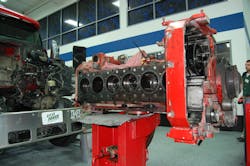As lubricant makers prepare the new PC-11 – short for “proposed category” 11– engine oil for licensing on Jan 1, 2016, many in trucking are wondering why a new motor oil blend is even necessary after the long-involved effort to bring CJ-4 to the market.
The reasons, however, are very simple, explained Pat Fetterman, industry liaison advisor with third-party lubricant testing firm Infineum: engine design changes, coupled with a significant reduction in soot-loading levels from the use of selective catalytic reduction (SCR) emission control systems, are affecting the chemistry of today’s diesel motor oil.
Thus a new blend is needed to deal with such changes to the oil’s operating environment, he stressed.
“In particular, SCR is vastly reducing the amount of soot generated from the engine,” Fetterman explained during a special engine teardown event in Mooresville, NC, last week that highlighted the performance of Safety-Kleen’s EcoPower recycled and re-refined motor oil over a nearly five-year million-mile on-road test.”
“For example, instead of a 4% to 6% soot load when we drained the oil at 40,000 miles from the 2007-compliant engines used in our EcoPower test, a 2010-compliant engine using SCR would see only a 1.5% to 2% soot load at the same oil drain interval,” he noted.
That soot load change would affect the oil’s “shear stability” in part because lubricant makers actually took advantage of all that soot in the CJ-4 formulations to help maintain oil viscosity. Without that soot, then, the possibility for a sooner-than-expected decline in viscosity could occur, noted Fetterman.
For a more detailed explanation of the chemistry involved, watch the video below:
Fetterman added that what he called the “re-advancement” of injection timing by SCR not only reduces the need for the engines exhaust gas recirculation (EGR) system to “burn up” particulates or “soot” produced by engine combustion, it increases the production of oxides of nitrogen (NOx) – and thus the oil needs to be reformulated in order to handle a potential increase in nitrate formation.
“We haven’t noticed NOx getting past the piston rings but we just don’t know yet what will happen long term,” he said. “Thus PC-11 is examining oxidation and nitration in oil for the very first time in Class 8 heavy trucks.”
PC-11 is also part of a wider effort to help truck OEMs comply with stringent mandated greenhouse-gas emissions (GHG) reduction and corresponding increases in miles per gallon performance for commercial vehicles set out in new federal rules that start taking effect in 2014.
The new category aims in part to create around a lower viscosity or “thinner” 10W-30 engine oil that will help reduce internal piston friction within a truck’s engine so it has to work less hard to produce power, thus improving fuel economy.
About the Author
Sean Kilcarr
Editor in Chief
Sean Kilcarr is a former longtime FleetOwner senior editor who wrote for the publication from 2000 to 2018. He served as editor-in-chief from 2017 to 2018.
